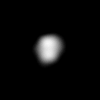Belinda (moon) facts for kids

Belinda viewed by Voyager 2 in 1986
|
|
| Discovery | |
|---|---|
| Discovered by | Stephen P. Synnott / Voyager 2 |
| Discovery date | January 13, 1986 |
| Designations | |
| MPC designation | Uranus XIV |
| Adjectives | Belindian |
| Orbital characteristics | |
|
Mean orbit radius
|
75,255.613 ± 0.057 km |
| Eccentricity | 0.00007 ± 000073 |
| 0.623527470 ± 0.000000017 d | |
| Inclination | 0.03063 ± 0.028° (to Uranus' equator) |
| Satellite of | Uranus |
| Physical characteristics | |
| Dimensions | 128 × 64 × 64 km |
|
Mean radius
|
40.3 ± 8 km |
| ~25,000 km2 | |
| Volume | ~380,000 km3 |
| Mass | ~3.6×1017 kg |
|
Mean density
|
~1.3 g/cm3 (assumed) |
| ~0.014 m/s2 | |
| ~0.034 km/s | |
| synchronous | |
| zero | |
| Albedo | 0.08 ± 0.01 |
| Temperature | ~64 K |
Belinda is a small, inner moon of the planet Uranus. It was first seen in pictures taken by the Voyager 2 spacecraft on January 13, 1986. At first, it was given the temporary name S/1986 U 5.
Belinda's Family of Moons
Belinda is part of a group of moons called the Portia group. This family also includes moons like Bianca, Cressida, Desdemona, Portia, Juliet, Cupid, Rosalind, and Perdita. These moons all travel in similar paths around Uranus and reflect light in similar ways. We don't know much about Belinda, except for its orbit, its size (about 45 kilometers wide), and how much light it reflects.
What Belinda Looks Like
The pictures from Voyager 2 show that Belinda is shaped like a stretched-out egg. Its longest side always points towards Uranus. The moon is very long and thin, with its short side being about half the length of its long side. Its surface appears to be grey in color.
Belinda's Future
The moons orbiting close to Uranus are not expected to stay in their current paths forever. Over many millions of years, their orbits can become unstable. Scientists believe that Belinda and another smaller moon called Cupid might be the first pair to crash into each other. This collision could happen in about 100,000 to 10 million years. This is because of how their gravity pulls on each other.
See also
 In Spanish: Belinda (satélite) para niños
In Spanish: Belinda (satélite) para niños
 | Toni Morrison |
 | Barack Obama |
 | Martin Luther King Jr. |
 | Ralph Bunche |

